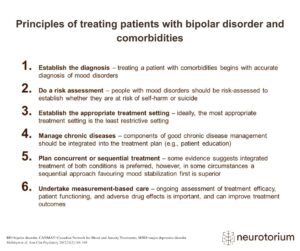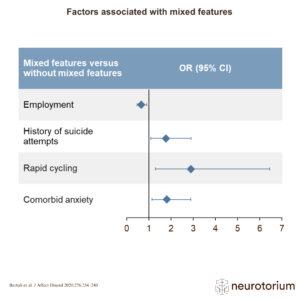Index for
slide deck
Introduction
-1024x576.jpg)
Treatment principles
The optimal outcome for a patient with major depressive disorder is a full recovery from the major depressive episode and to never become depressed again.
-1024x576.jpg)
Goals of treatment
The optimal outcome for a patient with major depressive disorder (MDD) is a full recovery from the major depressive episode and to never become depressed again.[Nierenberg & DeCecco, 2001] Treatment of MDD is divided into three phases, corresponding to different stages of…
Treating depression – non-pharmacological therapies
-1024x576.jpg)
Treating depression – non-pharmacological therapies
-1024x576.jpg)
Non-pharmacological therapy for depression
There are many non-pharmacological approaches to the treatment of depression. Some of those approaches are summarised in these slides.
-1024x576.jpg)
Psychotherapy – behavioural therapy
Non-pharmacological therapy options comprise psychotherapies and brain stimulation methods. Psychotherapies may be used together with antidepressants.[Sadock et al., 2009]
Generally, there is a lack of evidence surrounding the use of non-pharmacological therapies for MDD …
-1024x576.jpg)
Psychotherapy – interpersonal psychotherapy
Non-pharmacological therapy options comprise psychotherapies and brain stimulation methods. Psychotherapies may be used together with antidepressants.[Sadock et al., 2009]
Generally, there is a lack of evidence surrounding the use of non-pharmacological therapies for MDD …
-1024x576.jpg)
Psychotherapy – group therapy
Non-pharmacological therapy options comprise psychotherapies and brain stimulation methods. Psychotherapies may be used together with antidepressants.[Sadock et al., 2009]
Generally, there is a lack of evidence surrounding the use of non-pharmacological therapies for MDD …
-1024x576.jpg)
Psychotherapy – cognitive-behavioural therapy (CBT)
Non-pharmacological therapy options comprise psychotherapies and brain stimulation methods. Psychotherapies may be used together with antidepressants.[Sadock et al., 2009]
Generally, there is a lack of evidence surrounding the use of non-pharmacological therapies for MDD …
-1024x576.jpg)
Psychotherapy – mindfulness-based cognitive therapy (MBCT)
Non-pharmacological therapy options comprise psychotherapies and brain stimulation methods. Psychotherapies may be used together with antidepressants.[Sadock et al., 2009]
Generally, there is a lack of evidence surrounding the use of non-pharmacological therapies for MDD …
-1024x576.jpg)
Brain stimulation methods – electroconvulsive therapy (ECT)
Other than psychotherapy, non-pharmacological therapy options for the treatment of MDD include brain stimulation methods, such as electroconvulsive therapy (ECT), vagus nerve stimulation (VNS), and transcranial magnetic stimulation (TMS). The World Federation of Societies…
-1024x576.jpg)
Brain stimulation methods – vagus nerve stimulation (VNS)
Other than psychotherapy, non-pharmacological therapy options for the treatment of MDD include brain stimulation methods, such as electroconvulsive therapy (ECT), vagus nerve stimulation (VNS), and transcranial magnetic stimulation (TMS).[Sadock et al., 2009; Bauer et al.…
-1024x576.jpg)
Brain stimulation methods – transcranial magnetic stimulation (TMS)
Other than psychotherapy, non-pharmacological therapy options for the treatment of MDD include brain stimulation methods, such as electroconvulsive therapy (ECT), vagus nerve stimulation (VNS), and transcranial magnetic stimulation (TMS).[Sadock et al., 2009; Bauer et al.…
-1024x576.jpg)
Brain stimulation methods – deep brain stimulation
Other than psychotherapy, non-pharmacological therapy options for the treatment of MDD include brain stimulation methods, such as electroconvulsive therapy (ECT), vagus nerve stimulation (VNS), and transcranial magnetic stimulation (TMS).[Sadock et al., 2009; Bauer et al.…


-1024x576.jpg)
-1024x576.jpg)
-1024x576.jpg)
-1024x576.jpg)
-1024x576.jpg)
-1024x576.jpg)
-1024x576.jpg)
-1024x576.jpg)
-1024x576.jpg)
-1024x576.jpg)
-1024x576.jpg)
-1024x576.jpg)
-1024x576.jpg)
-1024x576.jpg)
-1024x576.jpg)
-1024x576.jpg)
-1024x576.jpg)
-1024x576.jpg)
-1024x576.jpg)
-1024x576.jpg)
-1024x576.jpg)
-1024x576.jpg)
-1024x576.jpg)
-1024x576.jpg)
-1024x576.jpg)
-1024x576.jpg)
-1024x576.jpg)
-1024x576.jpg)
-1024x576.jpg)
-1024x576.jpg)
-1024x576.jpg)
-1024x576.jpg)
-1024x576.jpg)
-1024x576.jpg)
-1024x576.jpg)


